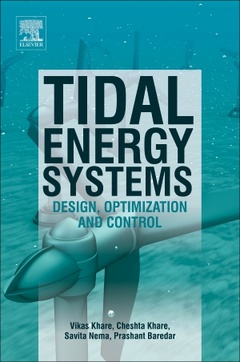Tidal Energy Systems Design, Optimization and Control
Auteurs : Khare Vikas, Khare Cheshta, Nema Savita, Baredar Prashant

Tidal Energy Systems: Design, Optimization and Control provides a comprehensive overview of concepts, technologies, management and the control of tidal energy systems and tidal power plants. It presents the fundamentals of tidal energy, including the structure of tidal currents and turbulence. Technology, principles, components, operation, and a performance assessment of each component are also covered. Other sections consider pre-feasibility analysis methods, plant operation, maintenance and power generation, reliability assessment in terms of failure distribution, constant failure rate and the time dependent failure model. Finally, the most recent research advances and future trends are reviewed.
In addition, applicable real-life examples and a case study of India?s tidal energy scenario are included. The book provides ocean energy researchers, practitioners and graduate students with all the information needed to design, deploy, manage and operate tidal energy systems. Senior undergraduate students will also find this to be a useful resource on the fundamentals of tidal energy systems and their components.
1. Fundamentals of Energy2. Fundamentals of Tidal Energy3. Prefeasibility Analysis of Tidal Energy Systems4. Optimum Sizing and Modeling of Tidal Energy Systems5. Control Systems of Tidal Power Plant6. Reliability Assessment of Tidal Power Plant7. Advances in Tidal Energy Systems
Cheshta Khare has obtained her M.E.(Honours) in Power Electronics at SGSITS, India, where she is also pursuing her PhD in Power Systems. Mrs. Khare is an Assistant Professor in the department of Electrical Engineering at SGSITS, Indore, India.
Savita Nema is currently a professor in the Department of Electrical Engineering, Maulana Azad National Institute of Technology (MANIT), Bhopal, India. She received her B.E. degree in Electrical Engineering in 1990 and her M.E. degree in Control Systems in 1993, both from Jabalpur Engineering College, Madhya Pradesh, India. She went on to complete her Ph.D. degree from Rajiv Gandhi Proudyogiki Vishwavidyalaya (RGPV) Bhopal, India, in 2011. She has more than 25 years’ experience in teaching and research. She was the head of the Electrical Engineering Department during 2016-2018. In addition, she was also a Chairperson of the Energy Centre, MANIT during 2018. She has guided around 50 M.Tech. dissertation and two PhDs
- Presents the fundamentals of tidal energy, including system components, pre-feasibility analysis, and plant management, operations and control
- Explores concepts of sustainability and a reliability analysis of tidal energy systems, as well as their economic aspects and future trends
- Covers the assessment of tidal energy systems by optimization technique and game theory
Date de parution : 10-2018
Ouvrage de 416 p.
19x23.3 cm
Thèmes de Tidal Energy Systems :
Mots-clés :
Adequacy; Automatic control; Biomass energy; Conventional energy source; Critical path method; Cuckoo; Detailed project report; Double basin system; Farm method; Flux method; Grasshopper; Grid codes (GCs); Grid parity; Kyoto protocol; Load frequency control; Nash equilibrium; Oscillating water column; Please check the that the copyeditor has assigned; and correct if necessary.-->; Tidal energy systemHOMER software; Please check the that the copyeditor has assigned; and correct if necessary.-->; Tidal energy systems; Probability; Program evaluation and review technique; Reliability; Renewable energy scenario; Renewable energy source; Single basin system; Solar energy; System adequacyPlease check whether the inserted are appropriate as given.-->; System security; Tidal energy system; Tidal lagoon; Tidal power plant; Tidal resource assessment; Tidal turbine; Tidal turbine control; Tide gauge; Voltage stability; Wave energy; Wave energy converter; Wind energy



